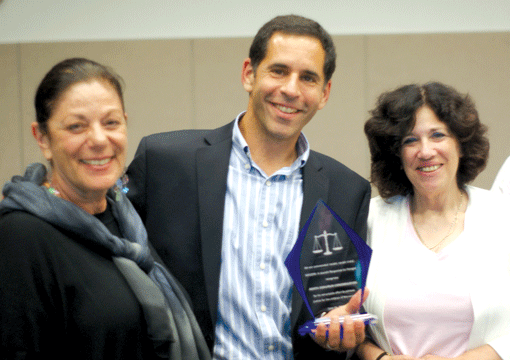While Minnesota lawmakers failed to pass MAZON-sponsored legislation to close the lunch and achievement gap for students, local advocates continue to press the issue
By ERIN ELLIOTT BRYAN / Community News Editor
In February, members of the Minnesota Senate and House of Representatives, led by Sen. Jeff Hayden and Rep. Ryan Winkler, introduced legislation aimed at closing the lunch and achievement gap in schools throughout the state.
The bill would have removed the mandatory school lunch co-payment for up to 61,500 low-income Minnesota children — essentially expanding the free lunch program to those students who currently qualify for reduced-price lunches (3-1-13 AJW).
The legislation was the result of months of work by the MAZON Advocacy Project–Minnesota (MAP-MN), chaired by Judi Tennenbaum and Scott Grayson, which includes more than 175 volunteers and 28 partner organizations, and is guided by MAZON: A Jewish Response to Hunger.
The bill did not pass during the most recent legislative session, and on June 19 members of MAP-MN, MAZON leaders and interested community members gathered at Adath Jeshurun Congregation to discuss how to move forward on this issue.
“While the effort itself was not successful this year, there is much for us to learn from this and a lot to be celebrated,” Abby Leibman, president and CEO of MAZON, told the AJW prior to the meeting. “It’s important for people to understand why these issues are still so challenging.”
“We came very close, this past legislative session, to making sure that underprivileged kids in Minnesota schools are not stigmatized or left unfed,” added Adath Jeshurun’s Rabbi Harold Kravitz, who chairs MAZON’s national board of directors. “Our 28 organizational partners and our approximately 175 volunteers from across the state are energized and committed to trying to solve this problem in the next legislative session. We welcome those who are interested in joining us.”

Samuel Chu, MAZON’s national synagogue organizer, describes Adath Jeshurun as an “anchor” congregation, which has spearheaded the involvement of local organizations — including Beth Jacob Congregation, Jewish Community Action, the Jewish Community Relations Council of Minnesota and the Dakotas (JCRC), Jewish Family and Children’s Service of Minneapolis (JFCS), the Minnesota Rabbinical Association, Shir Tikvah Congregation and Temple Israel.
“We went through a very difficult and challenging [legislative] session, and what it revealed was that hunger exists and persists not because of a lack of information or logistics or the economics of it, it’s political. There are often competing interests and there are often challenges,” Chu said. “Even though we didn’t get the specific funding in the policy, what has also happened, and what we’ll be talking about [at the meeting], is that we now have some concrete next steps.”
Chu noted that Gov. Mark Dayton’s office, for example, has said this issue will become a focus. The research has also indicated that school districts have a lot of responsibility in solving this problem — both in terms of feeding kids who are hungry and in formulating a consistent policy for treating them with dignity if they can’t pay.
At the meeting on June 19, state Sen. Terri Bonoff described what it was like to debate the bill in the Senate.
“You would have really thought that we were debating something so serious and an affront to what we all stood for, with the degree of resistance that came from corners that you would have never predicted,” she said.
And Sen. Yvonne Selcer, who was serving her first term, was equally disappointed that the MAZON-sponsored legislation was not included in the final K-12 funding bill.
“This was my first session and I just thought this is a no-brainer, that it would be included,” she said. “I couldn’t believe it when it was not.”
Selcer vowed that “we will get it done” during the next legislative session,
Despite the disappointment, MAZON recognized MAP-MN with an award “for its remarkable effort to achieve justice for the children of Minnesota.”
MAP-MN is one of eight pilot programs around the country. In Minnesota, the focus was on closing the lunch and achievement gap in schools; in other communities, similar groups assess their own needs and work on state- and locally focused projects.
“There is nothing like the experience of seeing how challenging it is to survive in the United States when you have limited resources to mobilize people to want to act to make the changes that are necessary so that people no longer need to rely on charity for their food,” Leibman said. “And I think knowing that there’s something people can do, it’s not just empowering for them, it is the catalyst to get people to engage.”
The MAP initiative is just one of many that MAZON directs on a national level to help the 50 million people who struggle with food insecurity. Most recently, MAZON was heavily involved in advocacy work around the Farm Bill, which authorizes funding for the nation’s food stamps (SNAP) program.
(On June 20, the U.S. House of Representatives rejected the Farm Bill with much of the debate focused on the bill’s cuts to the food stamp program.)
And Leibman acknowledged that solving the problem of hunger in America is extremely complex, as it is also affected by economic, housing and healthcare policies. But she believes MAZON is laying the foundation for a communal response that will continue to evolve as necessary.
“The more you learn about the real national shame of the United States, of 50 million people who don’t know whether they’re going to be having lunch today, the more you feel you have to step up and do something,” Leibman said. “This kind of work is very hard. It is confrontational, it is disappointing, it’s often heartbreaking, but it’s truly uplifting when you can work with a group of people, as we did here, who are able to overcome their disappointment and they’re able to rise above the heartache and say, We’ll go back again. And that’s really what we want to recognize and celebrate.”
(American Jewish World, 7.5.13)




















